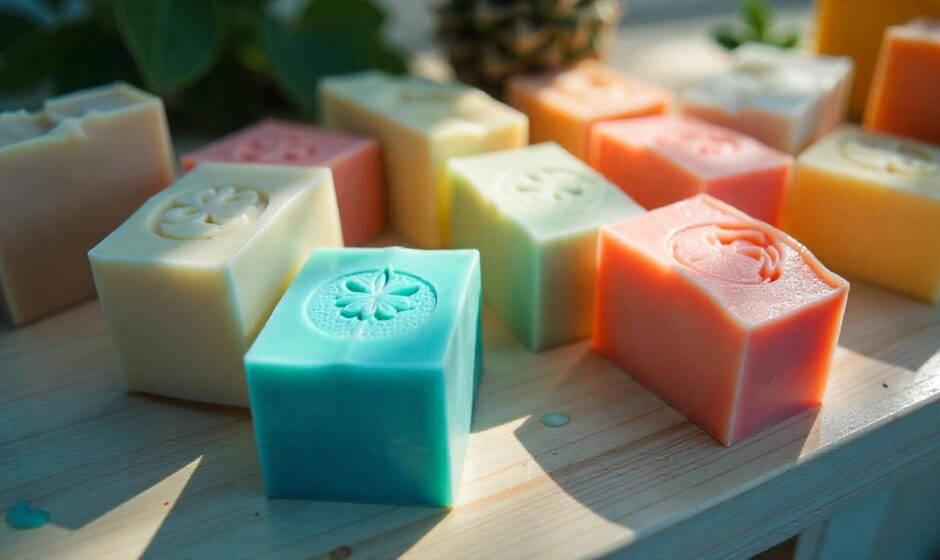Starting a soap business can be both exciting and rewarding. Soap is a versatile product that people need and use daily, making it an excellent choice for anyone interested in creating a successful small business. Whether you’re passionate about natural products or have a knack for creativity, starting a soap business allows you to turn your interests into income. In this guide, we’ll go through everything you need to know, from selecting the right soap base to designing packaging and setting up your brand. By following these steps, you can build a thriving soap business that attracts loyal customers.
Why Start a Soap Business?
The demand for handmade and natural products has increased in recent years, and handmade soaps are no exception. With people becoming more health-conscious and environmentally aware, there’s a market for products made with natural ingredients. Handmade soaps also offer a personalized touch that appeals to those seeking unique gifts or skincare options.
- Unique Selling Point: You can create soaps with specific benefits, such as moisturizing or exfoliating properties, by using ingredients like shea butter soap base or glycerin soap base.
- Creative Outlet: Soap making allows you to express creativity through colors, fragrances, and designs.
- Market Demand: There is high demand for products that are gentle, effective, and free from harsh chemicals.
1. Learn the Basics of Soap Making
Before starting your soap business, it’s essential to understand the basics of soap making. There are various techniques, but melt and pour soap is one of the simplest methods, making it ideal for beginners. With this technique, you melt a pre-made soap base, add colors, scents, and other ingredients, and pour it into molds. This approach saves time and allows you to focus on customization.
- Popular Soap Bases: Choose from options like glycerin soap base for hydration, shea buttersoap base for moisturizing properties, and goat milk soap base for skin-friendly benefits.
- Melt and Pour Soap Recipes: Experiment with different melt and pour soap recipes to create unique products that will stand out in the market.
2. Choose Your Target Market
Identify who you want to sell your soaps to. Your target market can be influenced by factors like your soap ingredients, scents, and packaging style. Understanding your audience allows you to make better choices about ingredients, branding, and marketing.
Common Target Markets:
- Eco-conscious customers: Those looking for organic soap made with natural ingredients.
- Luxury buyers: Customers who want high-quality products with premium ingredients.
- Gift shoppers: People who buy soaps as gifts or favors for special occasions.
3. Develop Your Brand
Creating a strong brand identity is essential to setting your soap business apart. Your brand includes your business name, logo, colors, and overall message. Think about what you want your brand to represent. Are you focused on natural ingredients? Or are you targeting customers who value luxury?
- Logo and Colors: Choose colors and a logo that reflect your brand’s personality. For example, green and brown can represent eco-friendly products, while gold and white can suggest a luxury feel.
- Tagline: Develop a short tagline that captures your business’s unique value.
Building a solid brand helps you stand out in a competitive market and builds trust with customers.
4. Set Up Your Workspace
A well-organized workspace is essential for producing high-quality soaps efficiently. Ensure you have a clean, dedicated area with enough space for soap making, packaging, and storage.
Essential Equipment:
- Soap Molds: Choose molds that fit your soap shape and design needs.
- Tools: Measuring cups, spoons, and mixing bowls are basic tools for soap making.
- Storage Shelves: These help keep your workspace organized and allow your soaps to cure properly.
5. Purchase Supplies for Soap Making
To start your soap business, you’ll need reliable supplies. Research reputable suppliers that offer high-quality materials at competitive prices. Look for suppliers who provide soap bases, fragrances, colorants, and packaging materials in bulk, as buying in larger quantities can reduce costs.
Basic Supplies:
- Soap Bases: Purchase a variety of bases to offer multiple products.
- Essential Oils: Essential oils are popular for scents and aromatherapy benefits.
- Colorants: Choose natural colorants for an eco-friendly product line.
Having the right supplies on hand will streamline your production process and ensure your products are consistent.
6. Design Your Packaging
Packaging plays a crucial role in your brand’s success. Creative and attractive packaging helps your soaps stand out on the shelves and creates a memorable experience for customers. Using custom soap boxes with your logo or unique designs can give your product a professional look.
- Why Packaging Matters: Well-designed packaging not only protects your products but also builds brand recognition and can make your soaps more attractive to customers.
- Types of Packaging: Options include simple wraps, eco-friendly materials, or custom-designed kraft soap boxes.
Make sure your packaging is easy to open and keeps the soap safe during transport.
7. Set Up Business Essentials
Like any business, a soap business needs to cover basics like licensing, insurance, and a marketing plan. These essentials help you operate legally and give customers confidence in your products.
- Business License: Check local regulations to ensure you have the right business license for selling soaps.
- Insurance: Product liability insurance can protect your business in case of issues with a product.
- Labels: Label each soap with its ingredients, weight, and scent. Accurate labeling builds trust with customers and keeps you compliant with regulations.
8. Develop a Marketing Strategy
Marketing is vital to attract customers and increase brand awareness. An effective marketing strategy includes both online and offline tactics to reach a broader audience.
- Social Media: Use platforms like Instagram and Facebook to showcase your products and reach potential customers.
- Word of Mouth: Encourage happy customers to share their experiences, as this can help grow your business through referrals.
- Local Markets and Events: Participate in farmers markets or craft fairs to introduce your products to local customers and gather feedback.
9. Build an Online Presence
An online presence expands your reach beyond local customers, allowing you to sell to people anywhere. Create a user-friendly website where customers can browse products, learn about your business, and place orders.
- Website: Include product photos, descriptions, and options to purchase directly from your website.
- Online Marketplaces: Consider selling on popular platforms like Etsy, which is ideal for handmade products like soaps.
- Google Business Profile: List your business on Google Maps to make it easy for local customers to find you.
10. Create a Customer Loyalty Program
Building a loyal customer base is essential for long-term success. A loyalty program rewards repeat customers, encouraging them to return for more products. This can increase customer retention and build a strong following.
- Loyalty Rewards: Offer discounts, exclusive products, or special deals to loyal customers.
- Subscription Boxes: Introduce a subscription service where customers receive new soaps each month.
Programs like these give customers a reason to keep buying from your brand.
Final Thought
Starting a soap business is a great opportunity for creativity, independence, and financial success. From mastering soap making to building a strong brand and creating unique packaging, each step helps you stand out in a competitive market. By following these steps, you can turn your passion for handmade soaps into a successful business that attracts and retains loyal customers. With dedication and a focus on quality, your soap business can grow into a rewarding venture. Ready to get started? Begin today and watch your soap business flourish.
Read More: Informavtie Articles



